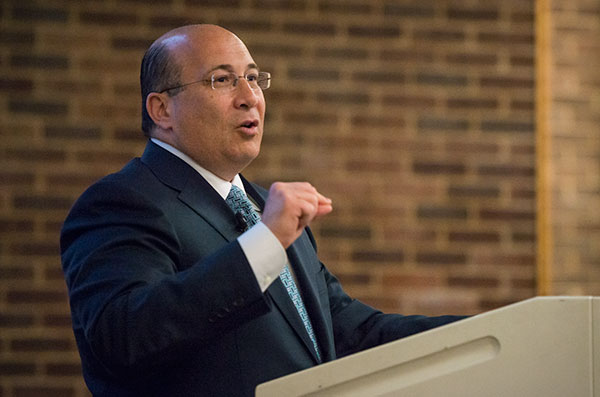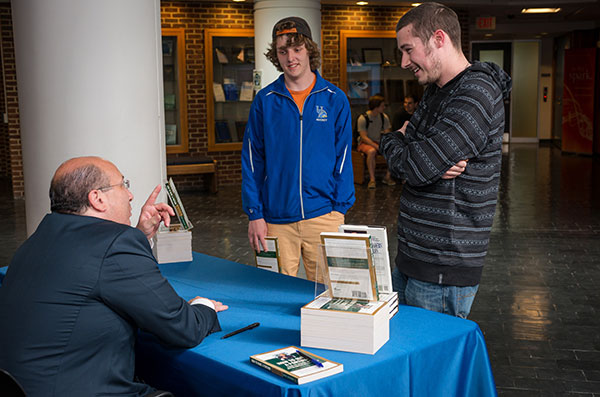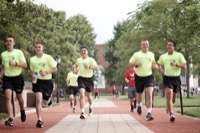Insatiable curiosity
Business journalist Insana speaks on financial markets, careers and life
4:02 p.m., May 14, 2014--After earning a degree in film, losing his first job as a production assistant at the Financial News Network (FNN) within four months to downsizing and anchoring the 1987 Black Monday crash in his first TV spot, business journalist Ron Insana knows firsthand what it means to learn through trial by fire.
“I had to learn fast,” said Insana, who spoke at the annual spring Chaplin Tyler Executive Leadership series hosted by the University of Delaware’s Alfred Lerner College of Business and Economics last week.
People Stories
'Resilience Engineering'
Reviresco June run
He would later be rehired by FNN as a producer, rising to managing editor and chief. “At 24 I worked as a full-time FNN anchor, but I had no idea how to anchor or how to interview people. My first day on the job was Oct. 19, 1987, the Black Monday crash. The Dow fell 508 points in one day -- almost 23 percent -- and I had the opportunity to discuss the crash to 12 million cable viewers.”
Today, said Insana, FNN reaches 100 million homes.
Insana shared his experiences in financial markets, investments and the U.S. economy as part of the Tyler Lecture, which is designed to bring leaders from business, nonprofit organizations and the government to campus to interact with students, faculty and the business community in an open exchange of ideas and perspectives.
“Tyler was a remarkable man who wrote Building for Success in Business: Your Mid-Career Years at the age of 99,” said Bruce Weber, dean of the Lerner College, of the lecture’s namesake. “The following year he published The View from Age 100 and he lived to be 105.
“Tyler appreciated the value of education, and completed his degree from Northeastern University in chemical engineering despite entering the military during World War I, which afforded him a career with DuPont that he held for 35 years. We are grateful to have Ron Insana here today, a man who also values education and is an astute observer of how life works and of how the economy works.”
Addressing the students, Insana echoed the importance of a college degree. “There is a four percent unemployment rate for college graduates, compared to eight percent for high school graduates and double digits for high school dropouts,” said Insana. “In a 30-year career, a college graduate can earn over $800,000 more than a high school graduate.”
Insana also spoke about the financial and housing crises and the current state of the markets, calling the economy “stronger than ever” and suggesting we may be entering “an American renaissance.”
“In the last several years, 600,000 jobs have been created in the energy sector,” said Insana. “The U.S. is producing more gas and oil than ever, which is changing the dynamics of manufacturing. Why? The energy cost is cheaper if the U.S. produces products at home. It’s more expensive to have jobs abroad and ship products back to the U.S.”
Insana also said he is “never afraid to be bearish with the markets.”
“I’ve witnessed three major financial crises -- actually more than three,” he said. “Fortunately, the federal government is getting much better with reducing our deficit -- from $1.4 trillion to $400 billion.”
He suggested the U.S. fares well in comparison to other countries with regard to its workforce, and sees the longevity of Baby Boomers in the workplace as a positive thing.
“There’s no reason to stop working,” said Insana. “Adjustments will need to be made to entitlement programs, but Chaplin Tyler worked into his 100s. There’s no doom and gloom about the U.S. economy, because there’s so much going on here. A lot of innovation is taking place in the technology world, for example. My mother is almost 90 years old, and she uses Skype to keep in touch with our family.”
Insana also cited examples of recent successes in domestic markets.
“Miami is adding 20,000 condos to the 80,000 condos that were built five years ago and have sold to Americans as well as foreign investors,” he said. "Both Carolinas have a strong economy. Texas is strong also, with Austin being the fastest growing city in the U.S.”
Inquiry as the key to success
At the close of the lecture, Insana fielded questions from the audience on everything from market bubbles and investing to the future job market and finding a successful career.
As far as jobs are concerned, Insana suggested opportunities in wealth management will increase due to the money management needs of Baby Boomers.
Questions also touched on the stock market, government regulations, the Affordable Care Act and the energy business, and Insana spoke about the dangers of terrorism, risks of the increasing pervasion of technology into people’s personal lives and advances in medical technology that will extend life expectancy.
“Genomic researchers predict that life expectancy will increase to about 150 years of age for the generation born today,” said Insana of revolutions in U.S. biotechnology and health care. “The world is changing, and it’s changing rapidly.”
Overarching life expectancy and the other issues, said Insana, is learning to recognize the unique challenges of your generation.
“Every generation experiences challenges,” said Insana. “For instance, my generation had a lot of face-to-face interaction that students today do not have. Your generation will have to work on interpersonal skills, which my generation did not have to do. Your ability to communicate face-to-face is something that you will have to work on. You cannot just email or text while at work.”
But beyond generational contexts, Insana emphasized that one of the keys to personal and professional success that he has recognized in the many prominent individuals he has interviewed throughout his career is to always be inquisitive.
“Bill Clinton, Hillary Clinton, Bill Gates, Warren Buffett -- they all have a high level of insatiable curiosity,” said Insana. “Both Clintons are driven by politics. Gates knows as much about malaria as he does about software because he is driven to eliminating malaria worldwide. These people are driven in ways that the average person is not driven.”
Insana also called Steve Cohen “the best trader on Wall Street.”
“He has a certain intuitive sense,” said Insana. “He started at age 13 with his bar mitzvah money. He, too, needs to know.”
Finally, inquiry leads people to success in his chosen field, said Insana
“Journalists need to know the whole story -- they need to nail it,” said Insana. “Andrea Mitchell -- she’s never satisfied. She never knows enough. You need to have rats in your stomach that will get the story out. All these men and women needed to know.”
Article by Terry Hartel
Photos by Kathy F. Atkinson












